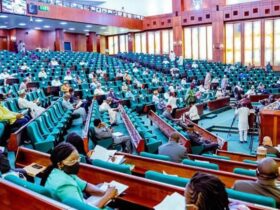A Nigerian graduate, who failed WASSCE 17 times, Dr Emmanuel Ahmadu, has called on the Federal Government to reconsider its policy stopping students below 18 years of age from sitting for ‘O’ Level examination.
WASSCE is West African Senior Secondary Certificate Examination.
Ahmadu, a mental health advocate in the U.S., told the News Agency of Nigeria (NAN) in Lagos, via telephone, that restricting teenagers under 18 years from sitting for the examinations would have negative consequences.
NAN reports that the Minister of Education, Prof. Tahir Mamman, said on television recently that the Federal Government had set a minimum age of 18 years for students sitting secondary school leaving examinations.
This means that underage candidates will no longer be allowed to sit for WASSCE and the Senior School Certificate Examination (SSCE) both of which are crucial for entrance into tertiary education institutions.
The directive also affects the West African Examinations Council (WAEC) which administers the WASSCE, and the National Examinations Council responsible for the SSCE.
Ahmadu said: “While the policy aims to ensure that students are mature and prepared enough to handle these important examinations, it also risks alienating those who, despite their ages, are ready and capable of succeeding academically.
“Having faced numerous challenges in my own educational journey, I understand the importance of flexibility in educational policies.
“Instead of a blanket restriction, a more individualised approach can be more effective, allowing students to be assessed based on their readiness rather than their ages alone.
“Using this more individualised approach will make educational policies more supportive, as it should be, ensuring that every student, regardless of their circumstances, has the opportunity to succeed,” he said.
Comparing the education policy in the U.S. with that of Nigeria, Ahmadu said the Nigerian educational system was one with immense potential and significant challenges.
“On the one hand, it has produced some of the brightest minds who have gone on to make remarkable contributions globally.
“The system is rigorous, and Nigerian students are known for their resilience and determination.
“However, my personal experience within the system highlights several critical issues that need to be addressed.
“I faced considerable challenges, including family instability that led to repeated disruptions in my education.
“Despite my academic capabilities, these disruptions meant that I had to sit for my O’level exams 17 times over five years before finally succeeding,” he said.
Ahmadu stressed that his experience underscored a lack of flexibility within the system to accommodate students who, for various reasons, do not follow the traditional educational path.
He noted that the rigidity of the system often left little room for those who faced unique challenges, whether due to economic hardship, family issues, or other factors.
Ahmadu is a multiple award winner, having received two highly esteemed global honours from the prestigious Marquis Who’s Who in America for 2024, among other laurels.
He was recognised as one of the Who is Who in Humanitarian Service and Philanthropy Worldwide and named a global mental health advocate by the organisation on Aug. 19, 2024. (NAN)










Got a Questions?
Find us on Socials or Contact us and we’ll get back to you as soon as possible.